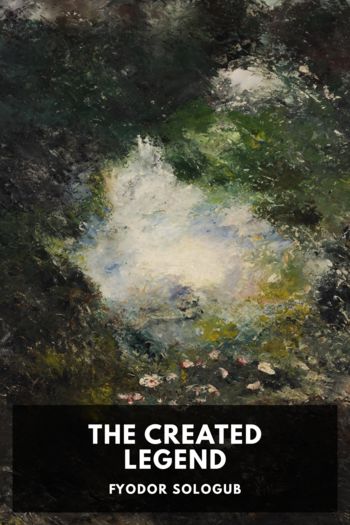The Little Demon - Fyodor Sologub (reading the story of the TXT) 📗

- Author: Fyodor Sologub
Book online «The Little Demon - Fyodor Sologub (reading the story of the TXT) 📗». Author Fyodor Sologub
In any case, I should like to warn my readers against the temptation of seeing only Russian traits in this novel. The portrait of Peredonov is an expression of the all-human inclination towards evil, of the almost disinterested tendency of a perverse human soul to depart from the common course of universal life directed by one omnipotent Will; and, taking vengeance upon the world for its own grievous loneliness, to bring into the world evil and abomination, to mutilate the given reality and to defile the beautiful dreams of humanity.
This inclination towards evil, raging in the hearts of mankind in all latitudes and longitudes, invests itself only outwardly with an appearance of selfish expedience. A soul marred by this tragic affliction, that of a morose separation from the world, is borne along by a sovereign justice, which rules worlds and hearts, upon disastrous paths, towards madness and towards death.
The afflicted soul does not rejoice at its gains, to such a degree visionary, to such a degree worthless. A foreboding of ultimate destruction torments it with a gnawing sadness.
Where then, in what blessed land, is not man tormented with this agonising sadness, these true tokens of the same morose and sombre affliction? The Russian khandra and the English spleen are the expression of one and the same malady of the spirit. Even in more noble souls, these harsh visitors, so familiar to both Englishmen and Russians, have been created by the omnipotent Will not without a beneficent design. They incessantly remind the soul, succumbing in the life struggle, that the enemy is near, cunning and strong.
I would be glad if my new readers should appraise not only the detestable sinfulness and perversity of a soul warped by the force of evil, but also the great yearning of this soul—the evil evil atones to a certain degree in this truly human feeling; and in this feeling the afflicted man also communes with each one of us.
This novel will not be accepted by you in condemnation of my country—my country has not a few enchantments, which make her beloved not only by her own, but also by the observant stranger. Perhaps the attentive reader will find even in this sombre novel certain reflections of enchanting Russian nature, and of the live Russian soul.
Fyodor Sologub
January 1916
The Little Demon IAfter Mass the members of the congregation scattered to their homes. A few stopped to talk under the old maples and lindens near the white stone walls, within the enclosure. All were in holiday dress and looked at one another cheerily. It appeared as if the inhabitants of this town lived peacefully and amicably—even happily. But it was only in appearance.
Peredonov, a schoolmaster in the gymnasia, stood among his friends, and as he looked at them gravely out of his small, stealthy eyes, across the golden rims of his spectacles, he remarked:
“Princess Volchanskaya herself made the promise to Vara. ‘As soon,’ she said, ‘as you marry him, I’ll hunt up an inspector’s job for him.’ ”
“But how can you think of marrying Varvara Dmitrievna?” asked the red-faced Falastov. “She’s your first cousin.”
Everyone laughed. Peredonov’s usually rosy, unconcerned, somnolent face showed anger.
“Second cousin,” he said gruffly, as he looked angrily past his companions.
“Did the Princess give you the promise herself?” asked Routilov, a tall, pale, smartly dressed man.
“She didn’t give it to me, but to Vara,” answered Peredonov.
“Of course, you are ready to believe all she tells you,” said Routilov with animation. “It’s easy enough to make up a tale. Why didn’t you see the Princess herself?”
“This is how it was: I went with Vara, but we didn’t find her in, missed her by just five minutes,” explained Peredonov. “She had gone to the country, and wouldn’t be back for three weeks or so. I couldn’t wait for her, because I had to be back here for the exams.”
“It sounds suspicious,” laughed Routilov, showing his yellow teeth.
Peredonov grew thoughtful. His companions left him; Routilov alone remained.
“Of course,” said Peredonov, “I can marry whom I like. Varvara is not the only one.”
“You’re quite right, Ardalyon Borisitch, anyone would be glad to marry you,” Routilov encouraged him.
They passed out of the gate, and walked slowly in the unpaved and dusty square. Peredonov said:
“But what about the Princess? She’ll be angry if I chuck Varvara.”
“What’s the Princess to you?” said Routilov. “You’re not going with her to a kitten’s christening. She ought to get you the billet first. There’ll be time enough to tie yourself up—you’re taking things too much on trust!”
“That’s true,” agreed Peredonov irresolutely.
“You ought to say to Varvara,” said Routilov persuasively, “ ‘First the billet, my dear girl, then I’ll believe you.’ Once you get your place, you can marry whom you like. You’d better take one of my sisters—your choice of the three. Smart, educated, young ladies, any one of them, I can say without flattery, a queen to Varvara. She’s not fit to tie their shoestrings.”
“Go on,” shouted Peredonov.
“It’s true. What’s your Varvara? Here, smell this.”
Routilov bent down, broke off a fleecy stalk of henbane, crumpled it up in his hand, together with





Comments (0)